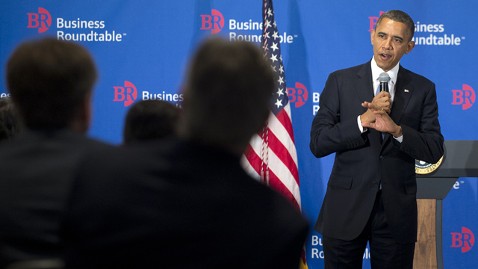Obama Warns GOP On Debt Ceiling: 'I Will Not Play That Game'

Saul Loeb/AFP/GettyImages
President Obama today issued a stern warning to Republicans in Congress threatening to use the debt ceiling as a bargaining chip in deficit negotiations, saying "it is not a game that I will play."
"I want to send a very clear message to people here: We are not going to play that game next year. If Congress in any way suggests that they're going to tie negotiations to debt ceiling votes and take us to the brink of default once again as part of a budget negotiation, which, by the way, we have never done in our history until we did it last year, I will not play that game," Obama told some of the nation's top CEOs at the Business Roundtable in Washington. "We've got to break that habit before it starts."
Obama referenced reports that Republicans may be willing to extend middle class tax cuts and agree to higher tax rates on the wealthy now and then try to use the raising of the nation's debt limit as leverage to extract spending cuts early next year.
Read more about Republicans' 'Doomsday' Plan
Get more pure politics at ABCNews.com/Politics and a lighter take on the news at OTUSNews.com
"That is a bad strategy for America, it's a bad strategy for your businesses, and it is not a game that I will play," he said, cautioning that the U.S. economy cannot afford the kind of uncertainty that resulted from the debt ceiling fight in August 2011.
"When I hear some on the other side suggesting that to resolve the possibility of a perpetual or a quarterly debt ceiling crisis that there is a price to pay, well, the price is paid by the American people and your businesses and economic environment worldwide," he said.
The president's warning on the debt ceiling, his strongest yet, comes amid the ongoing "fiscal cliff" standoff between the White House and House Republicans over how to avert the looming spending cuts and tax increases set to kick in on Jan. 1.
Obama continued to express optimism that a deal can be reached, but was adamant that it will require Republicans to agree to raise taxes on the top two percent of income-earners.
"We can probably solve this in about a week. It's not that tough," he said. "But we need that conceptual breakthrough that says we need to do a balanced plan; that's what's best for the economy; that's what the American people voted for; that's how we're going to get it done."